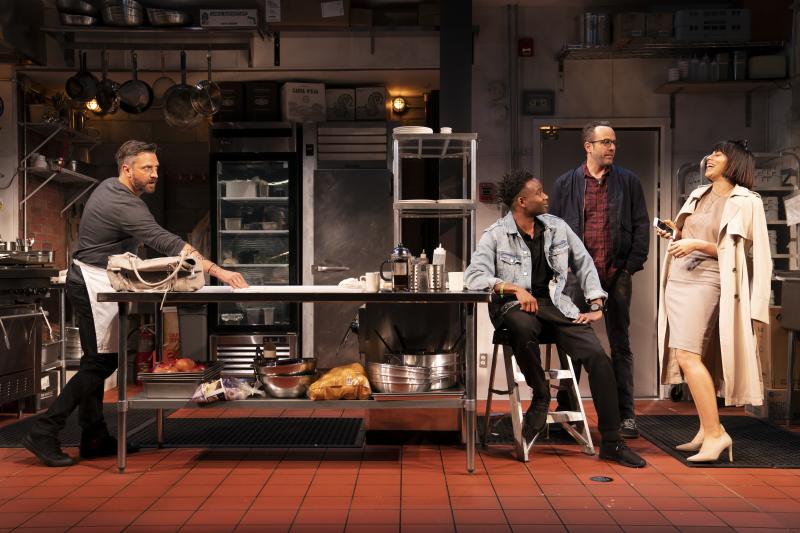Review: Raul Esparza and Krysta Rodriguez Clash in Theresa Rebeck's Art Vs. Commerce Comedy, SEARED
|
It's a bit of a longshot, perhaps, but given the organization's tendency to honor less-than-traditional terpsichorean achievements, don't be too shocked if Raul Esparza is named as one of this season's Chita Rivera Award nominees as Outstanding Male Dancer in an Off-Broadway show.
.jpg)
True, there's nary a twirl nor a ball-change to be found in his portrayal of Harry, the perfectionist chef for a boutique Brooklyn restaurant who gains a sudden shot of local fame after a brief mention of his divine expertise with scallops in a New York Magazine Best Bets blurb, but as the second act of Theresa Rebeck's comedy of art vs. commerce, Seared, commences, Esparza, backed by a cool jazz score supplied by sound designer Palmer Hefferan, takes full command of set designer Tim Mackabee's meticulously-realized and fully-functional kitchen, silently performing a kind of naturalistic ballet staged by director Moritz von Stuelpnagel, whose work with plays such as HAND TO GOD and TEENAGE DICK have proven his worth at interpreting life's non-traditional episodes.
With a combination of muscle memory and creative instinct, Esparza's Harry smoothly navigates his cramped quarters, washing, pouring, squirting, slicing and, yes, searing, with unbroken concentration, before using the dish before him as a canvas with which to settle his wild salmon creation into an esthetically pleasing design. He is as enraptured with having performed the task as we are in having witnessed it. And then there's that kicker of a button to end it all.
Given Esparza's history of memorable portrayals of tensely-mannered artists (TICK, TICK... BOOM!, SUNDAY IN THE PARK WITH GEORGE, MERRILY WE ROLL ALONG, TABOO), the unpredictably volatile Harry is a perfect match, especially when the playwright grants the character numerous verbal flourishes on topics such as the impracticality of culinary expectations and the vital importance of butter.
Harry and his business partner Mike (stressed out and responsible David Mason) have enjoyed success as a neighborhood favorite for the better part of two and a half years, but with a mere sixteen seats to fill, finances are shaky. Now, with people lining up on the street to sample the recommended scallops, Harry is refusing to make them and the dining room's only waiter, Rodney (a terrifically laid back performance by W. Tre Davis that grounds the proceedings), has to tell customers that they ran out.

and Krysta Rodriguez (Photo: Joan Marcus)
One of those customers is professional consultant Emily (Krysta Rodriguez, sporting a businesslike upbeat attitude) who adored her meal and sees great potential for, with a bit of a makeover, turning the place into an in-demand destination with a celebrity chef. Harry immediately dismisses the thought of listening to suggestions from a "girl" who he assumes has no experience in the restaurant business, but Mike has already struck a deal with her.
The main issue is Emily's insistence that having signature dishes that customers can rely on being available will increase business versus Harry's insistence in adjusting every day's menu on the availability of ingredients that meet his high standards.
Rebeck takes the clash between Harry's unfiltered animosity and Emily's expertise, glazed in professionally cheerful optimism, to an expected direction, swerving occasionally into more interesting moments, like when Esparza seems hopelessly seduced by an exquisitely crafted knife Emily offers Harry, which is all his in exchange for just a public endorsement. But the second act climax leads the story to an unsatisfactorily predictable ending.
The dialogue is spirited, for sure, and frequently funny, but a major hole in the plot is Emily's inexplicably extensive involvement in the day-to-day business of the restaurant. She serves customers, handles money and in one scene is left alone at closing, presumedly to lock up, even though it's mentioned that there is no arrangement yet for her to be compensated.
Harry's motivations are subtly hinted at by Esparza's finely detailed performance. He has numerous excuses for not cooking his in-demand scallops, but there's a darker subtext involved that eventually bubbles to the surface. In the end, after two acts of battling wits with the consultant, it's the relationship between the chef and the waiter that becomes the more interesting dynamic.
Videos
